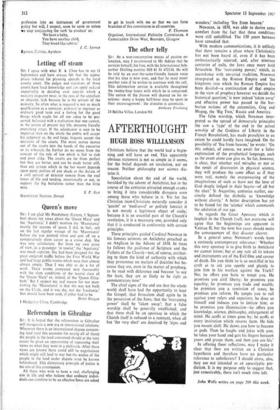AFTERTHOUGHT
HUGH ROSS WILLIAMSON
Christians believe that the world had a begin- ning and will have an end. This apparently obvious statement is not as simple as it seems, for the belief depends on revelation, not on reason. Neither philosophy nor science dic- tates it.
Speculation about the end of the world, heralded by the advent of Antichrist, has in the course of the centuries attracted enough cranks to bring it into considerable disrepute even among those who believe in it. Yet for the Christian (non-Christians naturally consider it 'quaint' or 'mediaeval' or politely lunatic) it is not merely a legitimate object of study; because it is an essential part of the Church's revelation, it is a necessary one, provided only that it is conducted in conformity with certain principles.
These principles guided Cardinal Newman in his famous sermons on Antichrist preached as an Anglican in the Advent of 1838. In them he follows the guidance of Scripture and the Fathers of the Church—not, of course, attribut- ing to them the kind of authority with which they pronounce on matters of doctrine but be- cause they are, even in the matter of prophecy, to be read with deference and because `to say the least, they are as likely to be right as commentators now.'
The chief signs of the end are that the whole world shall have had the opportunity to hear the Gospel; that Jerusalem shall again be in the possession of the Jews; that the 'restraining power' shall be 'taken away'; that a false worship shall be generally established; and that there shall be an apostasy in which the Church itself is reduced to a remnant, when all but 'the very elect' are deceived by 'signs and wonders,' including 'fire from heaven' Newman, in 1838, was able to derive some comfort from the fact that these conditions were still unfulfilled. The 130 years between have remedied that.
With modern communications, it is unlikely that there remains a place where Christianity has not been heard of, even if it has been enthusiastically rejected; and, after nineteen centuries of exile, the Jews once more hold Jerusalem. The 'restraining power,' which, in accordance with unvaried tradition, Newman interpreted as the Roman Empire and 'the kingdoms into which the Roman Empire has been divided—a continuation of that empire in the view of prophecy however we decide the historical question,' is now indeed 'taken away' and effective power has passed to the bar- barian nations of the extremities, Gog and Magog, the `Big Two,' Russia and America.
The false worship, which Newman inter- preted as the spread of democratic principles (he saw a 'type' of the end in the actual worship of the Goddess of Liberty in the French Revolution), has made proselytes to an extent he could hardly have imagined. On the possibility of 'fire from heaven,' he wrote: 'On this subject, of course, we await for a fuller explanation of the prophetical language, such as the event alone can give us. So far, however, is clear, that whether real miracles or not or the result of discoveries in physical science, they will produce the same effect as if they were real, namely the overpowering of the imaginations of such as have not the love of God deeply lodged in their hearts—of all but the elect.' St Augustine, centuries earlier, suc- cinctly defined the diabolic as 'knowledge without charity.' A better description has yet to be found for the 'science' which commands the adulation of our age.
As regards the Great Apostasy which is implicit in the Church itself, not everyone will agree that the beginnings are apparent in Vatican II, but the next five years should make the consequences of that disaster clearer.
In a general sense, Newman's words have a curiously contemporary relevance: 'Whether this very apostasy is to give birth to Antichrist we cannot know; but at any rate all its tokens and instruments are of the Evil One and savour of death. Do you think he is so unskilful in his craft as to ask you openly and plainly to join him in his warfare against the Truth? No; he offers you baits to tempt you. He promises you civil liberty; he promises you equality; he promises you trade and wealth; he promises you a remission of taxes; he promises you reform. He tempts you to rail against your rulers and superiors; he does so himself and induces you to imitate him; or he promises you illumination—he offers you knowledge, science, philosophy, enlargement of mind. He scoffs at times gone by; he scoffs at every institution which reveres them. He bids you mount aloft. He shows you how to become as gods. Then he laughs and jokes with you; he takes your hand and gets his fingers between yours and grasps them, and then you are his.'
In offering these reflections, may I make it clear that they are written on a Christian hypothesis and therefore have no particular relevance to unbelievers? I should stress, also, they are not intended as an apocalyptic pre- diction. It is my purpose only to suggest that, just conceivably, there isn't much time left.
John Wells writes on page 299 this week.






























 Previous page
Previous page